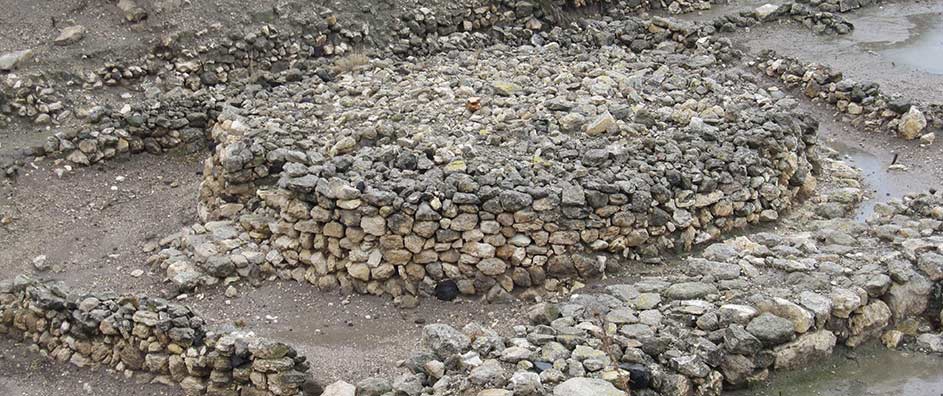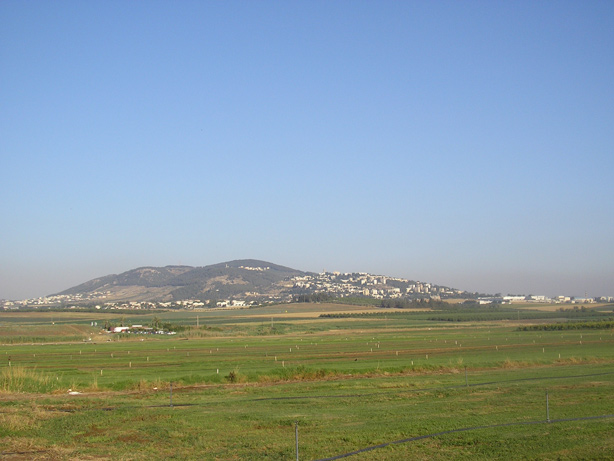The views expressed in our content reflect individual perspectives and do not represent the authoritative views of the Baha'i Faith.
In Ur and Haran, Abraham had dramatically demonstrated the foolishness of worshipping idols by smashing them. In the land of Canaan, he would use a different approach: the unadorned altar.
After entering Canaan, Abraham continued through the land until he arrived at a central spot near Shechem (probably in modern-day Nabulus) where there was a Moreh. Variously translated as hill, plain, or tree, Moreh has the connotation of being associated with a shrine, a sage, a priest, or something of a religious nature. In this case, because Abraham’s goal was to spotlight the power of the highest god, the Moreh might have been a hilltop altar dedicated either to Baal or to Thoru-el.
Imagine the scene: Abraham arrives in Shechem and goes to the spot where the chief priests of the area have built an imposing altar (maybe even a ziggurat) and adorned it with idols. Many of the idols are dressed in ceremonial robes, and bowls of food are arranged on the platform in front of them. Priests are chanting praises and accepting sacrificial offerings from onlookers. As Abraham stands in the middle of this busy throng of people, he sees beyond the bounds of time and place. As a divine revelator, he knows with absolute certainty the effect he and his descendants will have on this part of the world. So, as a physical symbol of what the future promises, and as a demonstration of his own faith in God, Abraham ignores the public altar and begins building one of his own nearby. Because Abraham eschews the use of idols, the new altar appears barren, bizarre, and utterly ridiculous to those who are watching. What, they ask themselves, is the good of an unadorned altar? To demonstrate the efficacy of the new altar, Abraham uses an already familiar ritual in Canaan: he burns a sacrificial offering and offers prayers. Those who see the smoke rise into the air continue to be confused. Without an idol to smell the smoke and accept the sacrifice, how can it have any effect? And, moreover, since Abraham isn’t a priest, how can he expect his prayers to be heard?
The Old Testament is quite clear in saying that Abraham built several altars in the land of Canaan, but, of course, we can’t be sure that he used them as a teaching tool in the way described here. Still, it seems quite likely. An unadorned altar would have been a physically meaningful way of communicating Abraham’s unshakeable faith in the existence of an all-powerful, all-seeing, and all-hearing, but invisible, God. One or two of those who watched Abraham worshipping in this new style might even have suddenly managed to appreciate the foolishness of having previously put their faith in dead lumps of stone and wood. If so, they may have become the first Canaanite followers of this odd new religion.
By building altars in several different places, which Abraham did as he moved about the land, he conveyed another essential truth: the influence of the one true God was not restricted to a specific spot or a specific altar. He belonged everywhere, could be worshipped from any number of different spots, and could smell the odor of sacrifice wherever it rose:
People think religion is confined in an edifice, to be worshipped at an altar. In reality it is an attitude toward divinity which is reflected through life. – Abdu’l-Baha, Divine Philosophy, p. 14.
The notion that a single God could be accessed from many different sites doesn’t astonish us now, but it seems to have been a revolutionary idea to Abraham’s contemporaries, because everyone “knew” that most gods didn’t move around much. A family’s household gods might be taken along on a journey to a new home, but they were very minor gods who had only a little bit of localized influence and were basically owned by the family.
All the big powers—the tribal and city gods—were tied to specific cities or certain tribes. A Canaanite would never carry an idol of Baal into new territory and still expect Baal to have any power. If he moved away, he’d have to leave Baal behind in Canaan and adopt the god of the new country.
Even El—who did get around a bit more than the others—could only be worshipped in a few special temples through the rituals of acceptable priests. Bearing these “truths” in mind, it would have been surprising to the Canaanites that Abraham, who had come into Canaan from Ur, continued to venerate the same god that he had known in his previous home. They must also have been shocked to see him engage in acts of worship without recourse to any of the more familiar priests or idols–and scandalized that Abraham seemed to expect them to abandon Baal and join him in venerating such a peculiar God.

















Comments
Sign in or create an account
Continue with Googleor